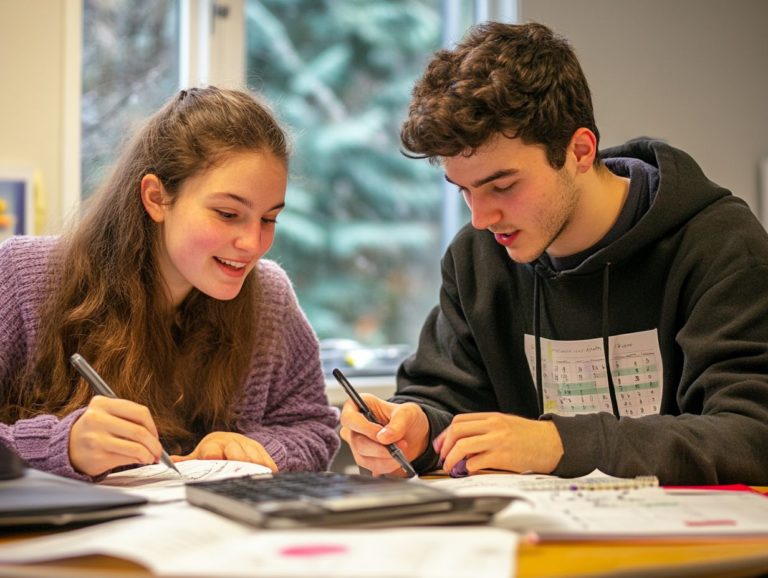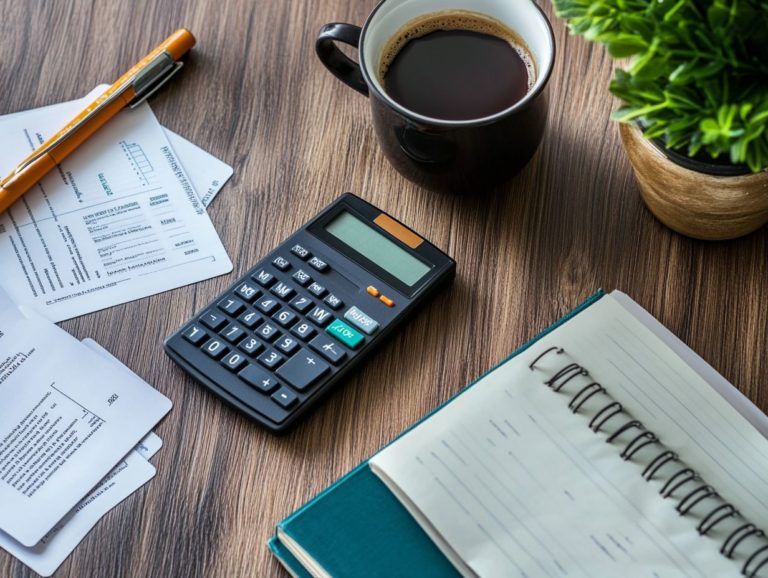what are the best study habits for test success?
Good study habits form the bedrock of academic success, especially when it comes to excelling in tests.
This article explores how effective study techniques can elevate your learning experience and boost your confidence during exams. You ll discover essential strategies, from crafting a structured study schedule to utilizing active learning methods, managing test anxiety, and reflecting on your performance afterward.
Each approach is designed to help you prepare effectively and thrive in any testing environment.
Get ready to supercharge your study routine and smash those academic goals!
Contents
Key Takeaways:

Consistent and organized study habits are crucial for achieving test success. Active learning techniques, such as creating a study schedule and organizing notes, can greatly improve preparation for tests. Additionally, understanding the best study techniques for test prep can provide effective strategies for managing test anxiety and maintaining focus during tests, leading to better performance.
The Importance of Good Study Habits
Cultivating good study habits is essential for you as a college student, greatly affecting your academic performance and overall learning experience.
By establishing effective study strategies, you not only improve your retention of information but also foster a positive attitude towards education.
In a competitive academic landscape, honing your time management skills and adopting a structured study approach helps you combat procrastination, alleviate test anxiety, and encourage deeper understanding, ultimately setting you up for exam success.
Embrace your unique learning style to enhance these habits, paving the way for lifelong learning and academic excellence.
Why Good Study Habits Lead to Test Triumph!
Study habits play a crucial role in shaping your success during exams. When you adopt effective test preparation strategies, you enhance memory retention and elevate your overall academic performance.
Engaging in self-testing allows you to actively recall information, solidifying your understanding and boosting your confidence as exam day approaches. By employing distributed practice spacing out your study sessions over time instead of cramming you promote deeper learning and significantly reduce the likelihood of forgetting.
Opting for short study sessions, ideally lasting no more than 30 minutes, can help you avoid fatigue and maintain focus, making the information much easier to absorb. Many find that setting a timer and incorporating brief breaks sharpens concentration remarkably.
By integrating these study habits into your routine, you not only prepare effectively but also cultivate a more enjoyable learning experience.
Effective Study Habits for Test Preparation

Implementing effective study habits is crucial for thorough test preparation, and understanding the best way to review test material can enable you to maximize your academic performance through structured studying and strategic techniques.
By focusing on these practices, you can create a solid foundation for success, ensuring that your efforts are both efficient and impactful.
Creating a Study Schedule
Creating a well-structured study schedule is essential for effective studying, allowing you to manage your time efficiently and enhance your academic performance. By thoughtfully mapping out each study period, you can break down your workload into manageable segments.
This often involves allocating time for both intensive study sessions lasting 60 to 90 minutes and shorter bursts of focused learning, around 25 to 30 minutes. It’s vital to intersperse these study blocks with regular breaks to keep your mind sharp and avoid burnout.
A well-balanced schedule doesn’t just prioritize your academic responsibilities; it also highlights the importance of self-care and downtime to recharge. This strategy boosts your time management and productivity.
Start applying these study habits today and watch your test scores soar!
Using Active Learning Techniques
Using active learning techniques is essential for achieving a deeper understanding and enhancing memory retention. These strategies engage you in a dynamic studying process, elevating your overall learning experience.
By incorporating methods like concept maps and self-testing, you can transform passive studying into an interactive journey. This not only boosts retention but also strengthens comprehension. Concept maps help you visualize the relationships between ideas, making complex information more manageable.
Self-testing promotes active recall, which is one of the most effective ways to solidify your knowledge. Together, these techniques create a robust framework that enables you to truly grasp your subjects.
This approach leads to improved academic performance and makes your educational journey more fulfilling.
Organizing Notes and Materials

Organizing your notes and study materials effectively is a crucial study technique that can significantly enhance your reading comprehension and academic performance in college.
By adopting an organized approach, you can streamline your study habits and easily locate key information when preparing for exams or tackling assignments.
Start by categorizing your notes by subject or topic to create a clear structure. Using digital tools, like note-taking apps, can further enhance your accessibility to information.
Focus on creating effective study guides. Summarizing core concepts and incorporating visual aids can significantly boost your retention of material.
These strategies empower you to approach your studies with confidence and clarity, leading to more efficient learning outcomes.
Maintaining Good Study Habits During Tests
Maintaining good study habits during a test is just as important as the preparation that precedes it. Effective strategies can alleviate test anxiety, sharpen your concentration, and elevate your academic performance.
By cultivating these habits, you can navigate tests with confidence and clarity, paving the way for success.
Strategies for Managing Test Anxiety
Implementing strategies to manage test anxiety is crucial for achieving your best performance. A positive mindset and effective anxiety management techniques can enhance your concentration and focus during exams.
Using self-testing methods allows you to familiarize yourself with the exam format and content, building confidence through practice. Visualizing success before the test creates a sense of calm, allowing for clearer thinking and better recall of information.
These techniques can reduce anxiety and boost your confidence! Incorporating deep breathing exercises or mindfulness practices can help you navigate test situations with ease, transforming your approach to assessments.
Tips for Time Management and Focus

Effective time management and focus are essential during a test. Establishing a well-thought-out strategy can significantly impact your test outcomes.
One practical approach is to set specific time limits for each section of the exam. This method helps you divide your attention effectively, ensuring you don t overlook any material.
Creating a distraction-free environment is paramount. Find a quiet space or use noise-canceling headphones to eliminate background noise. Incorporating short breaks between sections enhances your concentration, providing the mental refreshment needed to boost retention and problem-solving abilities when it matters most.
Post-Test Habits for Continued Success
Post-test habits are essential for your ongoing academic success. By reflecting on your test performance and making necessary adjustments, you can enhance your thinking about your own thinking skills and improve learning outcomes in future assessments.
Embracing this practice will deepen your understanding and position you for greater achievement in your educational journey.
Reflecting on Test Performance
Reflecting on your test performance is a crucial practice that gives you the power to assess your understanding and identify areas for improvement. Ultimately, this enhances your academic performance and learning outcomes.
This process provides a comprehensive overview of what went well and what didn t, helping you plan better strategies for understanding future material.
By carefully analyzing your results, you can pinpoint specific strengths, such as your grasp of key concepts, and weaknesses, like your time management during the exam.
Engaging in metacognition, which means thinking about your own thinking, plays a significant role here. It encourages you to step back and critically evaluate your approaches.
From there, you can devise effective plans to address gaps in your knowledge, making your study sessions more purposeful and aligned with your personal academic goals.
Implementing Changes for Future Tests
Implementing changes based on your previous test experiences is essential for developing effective study habits that can significantly enhance your academic performance in future assessments.
By closely examining which strategies worked and which didn t during past exams, you can uncover patterns that reveal your personal strengths and weaknesses. This reflection helps you take charge of your learning and tailor your study techniques.
You might consider using a method that involves reviewing material over increasing intervals or utilizing techniques that encourage you to actively recall information.
Engaging with peers for study sessions brings in diverse perspectives and insights, enriching your learning experience. Ultimately, this adaptability builds resilience and equips you with the necessary tools to navigate challenges confidently.
Start reflecting today to transform your study habits!






